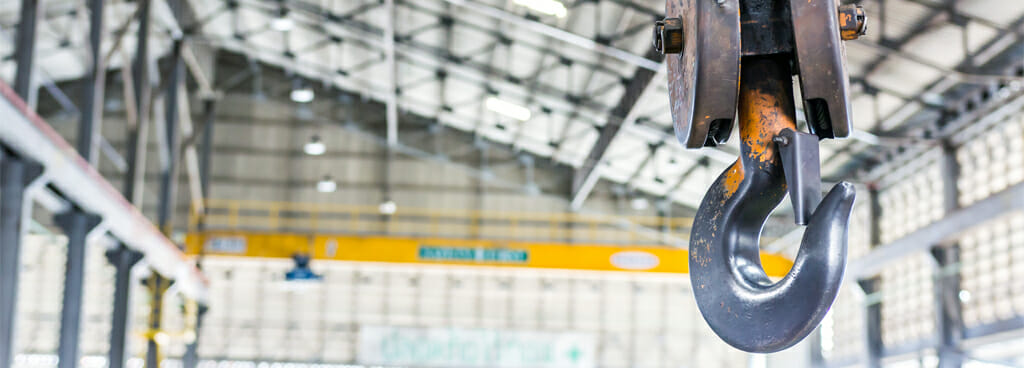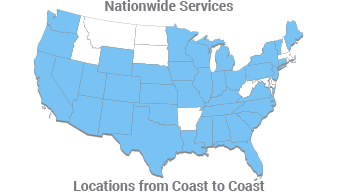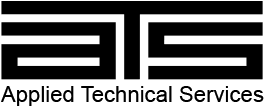- Home
- Services/IndustriesServicesindustries
- About Us
- LocationsStatesAccordion ContentAccordion ContentAccordion ContentAccordion Content
- Job Openings
- Quick Links
- ATS Family

Crane Hooks and Why They Need Inspections
Applied Technical Services’ Nondestructive Testing (NDT) group performs ASME B30.10 crane hook inspections to ensure that client equipment maintains safe operating conditions. Crane hooks sustain an uncountable number of significant stresses throughout their service life. These stresses are the result of the loads they move around — freight, construction materials, and assembled components get heavy, after all. This loading and unloading can create material fatigue over time, a strain that undermines the integrity of the crane’s hook as it can cause cracks to form and propagate. A compromised hook can fail at any time, which at best can set back work and at worst endanger everyone on the jobsite.
While crane operators can perform regular equipment inspections to check whether the hook is exhibiting visual indications of wear, some threats lie beneath the surface. Engineering codes like ASME B30.10 outline the recommended frequency and specifications of more in-depth analyses. Qualified inspectors, like ATS’ squad of Professionals, can help determine the health and remaining life expectancy of clients’ crane hooks.
ASME B30.10 and ATS' Crane Hook Inspection Capabilities
ASME B30.10 requires that crane hooks used in frequent or pulsating load cycles undergo this more rigorous periodic inspection at least once a year, or more frequently as determined by a Qualified Person such as one of our consulting engineers. To complete this assessment, our inspection team accesses the internal components of the hook (such as the hook shank, where most fatigue cracks form) and subjects them to NDT methods as they deem appropriate: magnetic particle testing (MT), liquid penetrant testing (PT), and in some cases ultrasonic testing (UT). While both MT and PT help inspectors detect discontinuities open to the surface, ultrasonic testing can locate flaws beneath the surface, as well as further evaluate the length, depth, and position of defects.
Once we have assessed the crane hook using NDT, our Engineers determine its remaining strength and establish a plan for how to safely get the most out of the equipment. They outline any recommendations when they return their findings, including whether the hook must be repaired or retired before further use. These experts perform all crane hook inspection services and calculations in accordance with the ASME B30.10 standard.
About ATS
Since our founding over 50 years ago, Applied Technical Services has exceled in providing consulting engineering expertise to companies in need. Our company has grown exponentially since 1967, now offering a suite of services that includes inspections, testing, calibrations, training, and forensic investigations. We perform all services according to our stringent quality management system to ensure we provide a consistently exceptional customer experience.
While the hook may be one of the less mechanically complex components of a crane, ATS wants to remind you that it is no less important to periodically verify its condition than any other part. Contact us today for a free quote on how we can help keep your crane in safe operating condition with our inspection services — We take a closer look!

Request Form
"*" indicates required fields
Engineering Links
- Asbestos Abatement Plan Design
- Asbestos Survey and Consulting Services
- ASME B30.10 Crane Hook Inspections
- Atlanta Lightning Protection
- Automotive Crash Testing
- Bridge Inspection Companies
- Bridge Structural Steel Weld Inspections
- Building Envelope Consultants
- Building Envelope Consulting Services
- Building Envelope Engineering
- Building Envelope Testing
- Building Inspection Company
- California Scaffold Inspections
- Commercial Engineering Services
- Commercial Structural Engineer Inspection
- Construction Materials Testing
- Consulting Structural Engineering Services
- Drone Facade Inspection
- Engineering Consulting Services
- EPA Certified Lead Abatement Contractors
- Equipment Failure Analysis
- Exposed Structure
- Facade Evaluation
- Facade Inspections
- Facade Inspection Milwaukee
- Facade Inspection San Francisco
- Facade Inspection Services
- Fall Hazard Training
- Fall Protection Equipment Inspection
- Fit for Service - FFS Assessment
- Fitness for Service
- Flood Damage Inspections
- GPR Contractors
- GPR Inspection Services
- GPR Scanning Concrete
- GPR Scanning Services
- Ground Penetrating Radar (GPR) Survey
- High Energy Piping
- Indoor Air Quality Assessment
- Indoor Air Quality Experts
- Indoor Air Quality Measurement
- Infrared Roof Leak Inspection
- Lead Abatement Contractors
- Lightning Protection for Building Design
- Lightning Protection Services
- Marine Structural Engineer
- Modal Analysis Testing
- Mold Inspection and Testing
- Mold Testing Companies
- NACE Coating Inspector
- NYC Facade Inspection
- Parking Structure Repair
- Penstock Inspections
- Philadelphia Facade Inspection
- Professional Mold Testing
- Property Condition Assessment Consultants
- RBI - Risk Based Inspections
- Roof Fall Prevention Systems
- Roofing Fall Protection
- Safety Harness Inspections
- Storm Structural Evaluations Engineering
- Structural Design Services
- Structural Engineering
- Structural Engineering Services
- UT and Phased Array Bridge Inspections
- Washington DC Lightning Protection
- Water Damage Inspection
